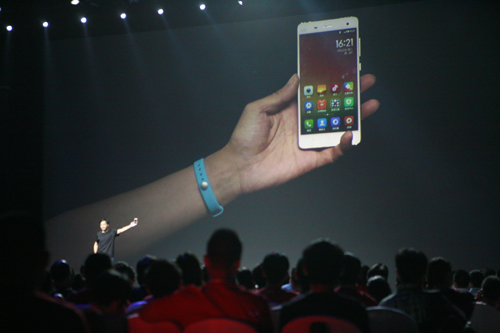|
 |
|
A NEWCOMER: Lei Jun, CEO of China's smartphone manufacturer Xiaomi Technology reveals the company's latest product, the MI4, in Beijing on July 22 (IC) |
The release of the iPhone 6 on September 10 triggered a new round of Apple-mania for smartphone users around the world. However, while many are thrilled with the larger screen and updated technology, some consumers are questioning a different aspect of the new phone—whether or not they should buy it while their personal information is at risk of being leaked.
Security concerns
On August 17, Apple Inc. confirmed that it has begun keeping the personal data of some Chinese users on servers on the Chinese mainland, marking the first time the tech giant has stored user data on Chinese soil. Apple said in a statement that the move was part of an effort to improve the speed and reliability of its iCloud service. Positioning data centers as close to customers as possible allows for faster service.
Experts commented that although Apple's move was ultimately a business decision, it was also a smart public relations tactic by the company, which has come under fire in China on a number of fronts over the past months for some of its local business practices.
In July, a China Central Television (CCTV) program criticized the location-based services (LBS) on the iPhone as a breach of privacy, in particular the "frequent locations" function that can track and record the location of a user's movements.
According to Ma Ding, Director of the Institute for Security of the Internet at the People's Public Security University of China, the frequent locations function could produce a specific and complete record of the user's behavior. Even if the owner turns off the function, the back end system still collects data, he noted.
"This is extremely sensitive data," said Ma. "If the data were accessed, it could even reveal state secrets."
In response, Apple claimed that location-based data saved onto the iPhone is all local and encrypted, meaning the information isn't available to Apple or any third party. The company stated that there is no backdoor to any of Apple's products or services.
However, CCTV argued that although users have the option to turn on or turn off LBS functions at the initial setup of the phone, the default setting is "on" and the function is buried deep within the settings menu of the iPhone, leaving many users unaware of its existence. Of the 60 iPhone users CCTV selected at random in cities such as Beijing and Qingdao, just five said they were aware of the function.
Against this backdrop, the media publicized the removal of 10 of Apple's products, including the iPad, iPad mini, MacBook Air and MacBook Pro, from China's government procurement list, which was released in late July. It was reported that these products failed to be listed because Apple Inc. had not offered the necessary documents to the authorities before the deadline. Whatever the exact reason, security looms larger than ever when it comes to government procurement.
In 2013, the leaks from former U.S. National Security Agency contractor Edward Snowden raised alarms about the threat of U.S. surveillance faced in countries all over the world. Data shows that cyber attacks on China's key organizations in sectors such as the military, scientific research and finance have mainly come from the United States.
According to Mei Xinyu, a trade expert from the Ministry of Commerce, many countries have become wary of foreign IT products since the Snowden revelations.
In May, China's State Internet Information Office announced that it would start security vetting of major IT products and services used by national security and public entities. In the same month, China prohibited use of Microsoft's Windows 8 operating system on all desktops, laptops and tablet PCs purchased by Central Government organizations in a bid to ensure computer security.
| 